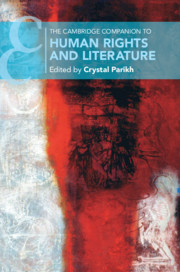Book contents
- The Cambridge Companion to Human Rights and Literature
- The Cambridge Companion to Human Rights and Literature
- Copyright page
- Epigraph
- Contents
- Notes on Contributors
- Chronology of Major Works and Events, 1215–2018
- Introduction
- Part I Genealogies and Contexts
- 1 Recounting History, Locating Precursors for Human Rights
- 2 Humanitarianism’s Way in the World
- 3 Literature, Human Rights, and the Cold War
- 4 Human Rights in the Vernacular
- Part II Fashioning Methods
- Part III Generic Representations
- Part IV Writing Human Rights
- Select Bibliography
- Index
- Cambridge Companions To …
4 - Human Rights in the Vernacular
Translating and Inventing Rights Outside the State
from Part I - Genealogies and Contexts
Published online by Cambridge University Press: 24 June 2019
- The Cambridge Companion to Human Rights and Literature
- The Cambridge Companion to Human Rights and Literature
- Copyright page
- Epigraph
- Contents
- Notes on Contributors
- Chronology of Major Works and Events, 1215–2018
- Introduction
- Part I Genealogies and Contexts
- 1 Recounting History, Locating Precursors for Human Rights
- 2 Humanitarianism’s Way in the World
- 3 Literature, Human Rights, and the Cold War
- 4 Human Rights in the Vernacular
- Part II Fashioning Methods
- Part III Generic Representations
- Part IV Writing Human Rights
- Select Bibliography
- Index
- Cambridge Companions To …
Summary
This chapter argues for the idea of collective rights with which a people endow themselves in the face of political crises, as opposed to the more popular concept of human rights which is to be given by (often hostile) states to individuals, at the urging of international organizations. Citing examples such as those of the Zapatistas in Chiapas, Mexico and the people of Palestine, the author sheds light on the political rewards in the translation of the rights of the individual to collective rights. The latter kind has the advantage of having evolved from cultural specificities, as opposed to the more conventional idea of transcendent human rights. They are more in tune with material realities as well as unobligated to universal standards and forms.
- Type
- Chapter
- Information
- The Cambridge Companion to Human Rights and Literature , pp. 58 - 72Publisher: Cambridge University PressPrint publication year: 2019

